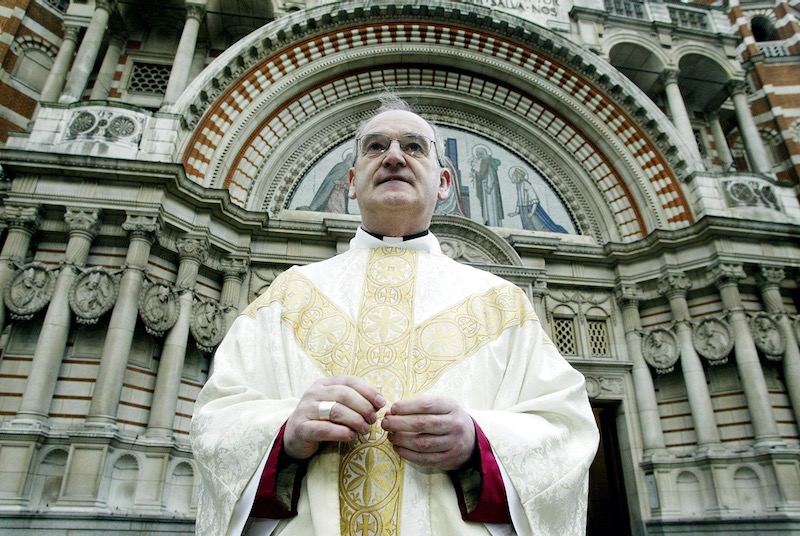The Archbishop of Cardiff has expressed his “disappointment” that churches in Wales will have to close for three weekends under the coronavirus “circuit break” lockdown.
The new restrictions in Wales begin on Friday and last until Monday 9 November. Wales joins Ireland as the other country in Europe to temporarily suspend public worship in line with new restrictions.
Churches in Wales can continue to run any food banks and also they to offer online Mass, without congregations.
Archbishop of Cardiff, George Stack, said: “I am naturally disappointed at the forthcoming ‘firebreak’ measures which, once again, will see our churches closed for public worship. Since their re-opening at the end of the first lockdown, our churches have been places of safety and security as well as tranquillity and peace, so much needed in these turmoil ridden days.
“They have been exemplary in conforming to social distancing measures, health and safety requirements and track and tracing procedures. We are grateful to the teams of volunteers which have made this possible.”
He continued: “Notwithstanding the impact of the live Streaming of Mass and other services in recent months, gathering to celebrate Mass and worshipping God as a community of faith lies at the heart of our religious life. Ours is an incarnational religion. The ‘Eucharistic famine’ of the recent months of lockdown has been painful to us in so many ways known and unknown. Churches are not just places in which we worship God but with which we worship God.”
He said the Catholic Church is continuing to work with the Welsh government to see if churches may remain open for private prayer at specified times over the next two weeks. “Part of that prayer will surely be that the ‘firebreak’ measures will achieve their purpose of reducing the level and speed of infections caused by the coronavirus pandemic and restore the nation to health.”
In England, churches remain open and the current guidance remains the unchanged, whether an area is in tier one, two or three of lockdown.
In our latest Tablet podcast, Christine Allen, director of Cafod, talks about how we can take some of the teaching in the Pope’s new encyclical Fratelli Tutti to help us be better neighbours, at a time when we are all challenged by the coronavirus pandemic.
A spokeswoman for the Bishops' Conference of England and Wales said that in England, places of worship are not changed by tiers one, two or three. “So, unless and until the Government changes its approach, places of worship remain open in England. Wales has taken a different approach, more stringent than any of the current tiers.”
Currently, the guidance for England is that face coverings have to be worn in places of worship unless a person has an exemption from this, and since the end of September churches must also abide by the “rule of six” restrictions in the number of people permitted at services such as weddings. The Church of England has published precise guidance as to what is and is not permitted under the “rule of six” and the tier system, and what exemptions the churches have.
In Scotland, where new measures to prevent the spread of the virus came into effect last Friday, the Catholic bishops' guidance for churches is similar to that in England.
In Ireland, in response to public health officials’ concern over spiralling Covid rates, the Government is moving the country this week to level five restrictions for six weeks. Religious services will continue to be held online, as they were under level three. Churches will remain open for private prayer. Just ten mourners will be permitted to attend a funeral. Weddings can still go ahead with up to 25 guests allowed at the ceremony and reception.
The Executive in Northern Ireland has also tightened restrictions to curb Covid-19. Under these latest restrictions, churches remain open and liturgies continue subject to the guidance including the mandatory requirement to wear face coverings when entering and exiting. The limit on gatherings of 15 people does not apply to churches and congregation sizes are based on the capacity of the building with social distancing measures in place. Attendance at funerals and weddings is limited to 25 persons and post-ceremony receptions or gatherings are not permitted.
The different restrictions for public worships means that some cross border dioceses have two sets of measures operating for their parishes. Bishop Larry Duffy of Clogher diocese said: “As Bishop of a diocese that is divided by the border, I am very aware of the fear, frustration and inconvenience that people are experiencing. I am especially conscious of the loss felt by so many on the southern side of the border at not being able to celebrate public Mass together. In fact, in some of our parishes Mass is available in one part while not in the other. The Eucharist is an essential part of the spiritual nourishment of Catholics and I look forward to the day when we can all celebrate it again.”
Reaction to the changes in Wales on social media was of disappointment.
Father David Palmer, an Ordinariate priest in Nottingham, tweeted: “Wales has decided to close the Churches again. I will be arrested before I deny the sacraments to the people of God again. And I repent for having backed down before. Eternal life comes before this life... or our faith means nothing.”
David Quinn, director of the Iona Institute, who has questioned the proportionality of the latest restrictions in Ireland, noted that Wales was the one other place in Europe to join the Republic in stopping public worship.



 Loading ...
Loading ...